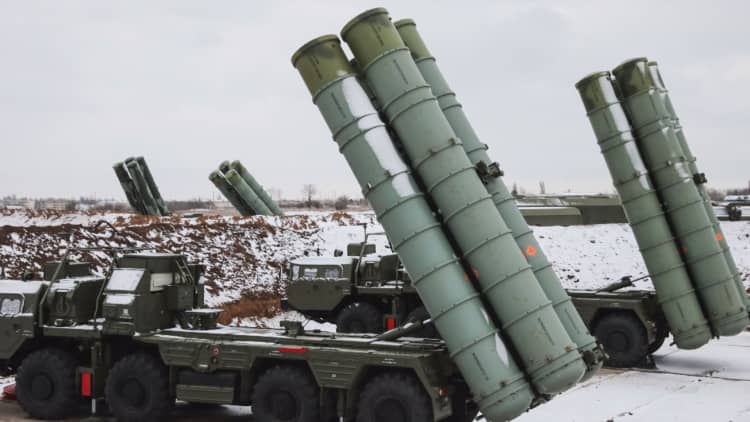WASHINGTON — President Donald Trump's Wednesday meeting with Turkish President Recep Tayyip Erdogan comes as the two NATO allies navigate several thorny national security issues.
Yet while Erdogan's visit comes on the heels of his military's action against the Kurds in northern Syria, following Trump's decision to withdraw U.S. forces from the area, another U.S.-Turkey dustup has flown under the radar. And it involves an arms deal with Russia.
The U.S. could sanction Turkey for buying Russia's S-400, a mobile surface-to-air missile system that is said to pose a risk to the NATO alliance as well as to America's most expensive weapons system: Lockheed Martin's F-35 jet.
But Turkey shrugged off the potential sanctions, and Trump himself has been sympathetic to Erdogan's decision. In July, Trump said he could not blame Turkey for buying the S-400, a move that resulted in dropping the NATO ally's participation in the F-35 program.
"We'll be talking about the S-400 and we will be talking about the F-35," Trump said Wednesday alongside Erdogan in the Oval Office. "We may report back to you later about that because we are having a second meeting in a little while," he added when pressed on the issue.
Earlier this year, Trump downplayed Turkey's acceptance of the S-400 and placed blame on the Obama administration.
"I don't blame Turkey because there are a lot of circumstances and a lot of ... problems that occurred during the Obama administration," Trump said in July. "This dates back to the Obama administration, which was a disaster."
Read more: Turkey proceeds with deal for Russian missile system despite US and NATO warnings
Trump then did not elaborate on whether he would impose sanctions on Turkey for doing business with the Kremlin. Under the Countering America's Adversaries Through Sanctions Act, which the president signed in August 2017, Turkey could face economic sanctions for buying the Russian-made missile system.
"It's a tough situation. They're getting the S-400 and our statues and everything else — as you do that, you just can't order this equipment," Trump said. "And generally speaking, you can't order equipment period."
Turkey's messy weapons deal with the Kremlin
In 2017, Ankara brokered a deal reportedly worth $2.5 billion with the Kremlin for the S-400 despite warnings from the U.S. that buying the system would come with political and economic consequences.
The S-400, the successor to the S-200 and S-300 missile systems, made its debut in 2007. Compared with U.S. systems, the Russian-made S-400 is believed to be capable of engaging a wider array of targets, at longer ranges and against multiple threats simultaneously.
In efforts to deter Turkey from buying the S-400, the State Department offered in 2013 and 2017 to sell the country Raytheon's Patriot missile system. Ankara passed on the Patriot both times because the U.S. declined to provide a transfer of the system's sensitive missile technology.
All the while, Turkey became a financial and manufacturing partner in Lockheed Martin's F-35 jet, the world's most advanced fighter.
As Ankara's inevitable acceptance of the S-400 came to fruition, the Pentagon announced it would begin "unwinding" Turkey's participation in the F-35 program.
Last month, the Pentagon's acquisition chief reiterated Turkey's removal from the colossal weapons program.
"There has been no change to return Turkey to the F-35 program. The S-400 air defense system, which is incompatible with the F-35, remains in Turkey," Ellen Lord, undersecretary of Defense for acquisition and sustainment, told reporters at the Pentagon.
"As I've said previously, Turkey makes nearly 1,000 parts for the F-35 and will continue to do so until Turkey's F-35 supply chain responsibilities transfer at the end of March in 2020," she added.
After his country was forced out of the multinational weapons program, Erdogan met with Russian President Vladimir Putin and attended an annual Russian air show in Moscow. After the August visit, Erdogan expressed interest in buying the Kremlin's Su-35 fighter jets.
WATCH: Weapons sale between US, Turkey and Russia gets more complex



